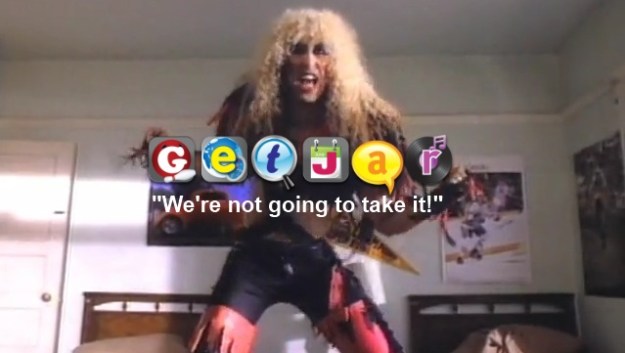
Amazon scored an early victory last week in its battle against Apple over the use of the term “App Store.” Despite this setback, Apple has sent out a Cease & Desist letter to GetJar, a major third-party app store for Android demanding that it cease using the term “App Store” in its marketing and branding. Pumped up on 80s hair metal, GetJar has responded publicly on its blog, detailing its problems with Apple and telling us all that it has no plans to take this abuse lying down.
“….GetJar won’t be subject to this kind of bullying,” writes GetJar. “We’re not going to “Cease & Desist”. We were here long before Steve & Co. We were built by developers, to help developers. Not to help sell handsets or search results. In the words of Twisted Sister: We’re not going to take it! Steve Jobs isn’t our Dad.”
Despite GetJar’s unusually strong language and the large number of Twisted Sister references (we removed two links to the “We’re not gonna take it” music video in that quote alone), the company makes a few fair points. First being that it doesn’t even compete with Apple. Since the iOS platform is closed and managed only by iTunes, GetJar merely directs people to the iTunes store if they happen to be on an iPhone, as a courtesy to its users. Most of its business comes from Android, and its been using the term App Store here and there since 2009, so why is Apple only now complaining?
More interesting is GetJar’s feelings on the industry, as a whole. The app store, which specializes in free apps, doesn’t like what it’s seeing: “….let’s look at where the industry is heading. The truth is really alarming. The ecosystem as a whole is becoming increasingly closed. It’s character is dictated by larger companies exercising excessive force to get bigger shares of the pie. For example, Android was supposed to be FREE and open; yet developers can’t choose their billing solution. They have their price points micro-managed for them without input. If Apple isn’t suing Amazon, it’s suing start-ups. Now Microsoft, who is struggling to gain traction with Windows Mobile, is charging OEM’s for using Android using our country’s broken patent system. Where are all of these law suits and threats getting us? Is anyone actually worrying about whether app developers and content providers make enough money to keep the lights on?”
Whether Apple has the right to assert ownership of the term App Store will be debated in court for years, most likely, but is its behavior any different from Microsoft who is pretty much asserting ownership of Android, despite the fact that it is nothing like Windows Mobile or Windows Phone.
If you’d like to help GetJar stick it to Apple, you can follow them on twitter @OpenAndFreeApps.
Editors' Recommendations
- Everything you need to know about the massive Apple App Store outage
- Apple may do the unthinkable — allow third-party iPhone app stores
- The ugly side to Apple’s embrace of third-party App Store payments
- The best note-taking apps for iOS and Android
- Apple and Google are going to need to open up their app stores in South Korea


